- Home
- Robert E. Howard
The Best of Robert E. Howard, Volume 1 Page 9
The Best of Robert E. Howard, Volume 1 Read online
Page 9
Minutes flew by; the clang and clash of steel did not diminish. Now they stood squarely in the center of the glade, Le Loup untouched, Kane’s garments red with the blood that oozed from wounds on cheek, breast, arm and thigh. The Wolf grinned savagely and mockingly in the moonlight, but he had begun to doubt.
His breath came hissing fast and his arm began to weary; who was this man of steel and ice who never seemed to weaken? Le Loup knew that the wounds he had inflicted on Kane were not deep, but even so, the steady flow of blood should have sapped some of the man’s strength and speed by this time. But if Kane felt the ebb of his powers, it did not show. His brooding countenance did not change in expression, and he pressed the fight with as much cold fury as at the beginning.
Le Loup felt his might fading, and with one last desperate effort he rallied all his fury and strength into a single plunge. A sudden, unexpected attack too wild and swift for the eye to follow, a dynamic burst of speed and fury no man could have withstood, and Solomon Kane reeled for the first time as he felt cold steel tear through his body. He reeled back, and Le Loup with a wild shout, plunged after him, his reddened sword free, a gasping taunt on his lips.
Kane’s sword, backed by the force of desperation, met Le Loup’s in midair; met, held and wrenched. The Wolf ’s yell of triumph died on his lips as his sword flew singing from his hand.
For a fleeting instant he stopped short, arms flung wide as a crucifix, and Kane heard his wild, mocking laughter peal forth for the last time, as the Englishman’s rapier made a silver line in the moonlight.
Far away came the mutter of the drums. Kane mechanically cleansed his sword on his tattered garments. The trail ended here, and Kane was conscious of a strange feeling of futility. He always felt that, after he had killed a foe. Somehow it always seemed that no real good had been wrought; as if the foe had, after all, escaped his just vengeance.
With a shrug of his shoulders Kane turned his attention to his bodily needs. Now that the heat of battle had passed, he began to feel weak and faint from the loss of blood. That last thrust had been close; had he not managed to avoid its full point by a twist of his body, the blade had transfixed him. As it was, the sword had struck glancingly, plowed along his ribs and sunk deep in the muscles beneath the shoulder-blade, inflicting a long and shallow wound.
Kane looked about him and saw that a small stream trickled through the glade at the far side. Here he made the only mistake of that kind that he ever made in his entire life. Mayhap he was dizzy from loss of blood and still mazed from the weird happenings of the night; be that as it may, he laid down his rapier and crossed, weaponless, to the stream. There he laved his wounds and bandaged them as best he could, with strips torn from his clothing.
Then he rose and was about to retrace his steps when a motion among the trees on the side of the glade where he first entered, caught his eye. A huge figure stepped out of the jungle, and Kane saw, and recognized, his doom. The man was Gulka, the gorilla-slayer. Kane remembered that he had not seen the black among those doing homage to N’Longa. How could he know the craft and hatred in that slanting skull that had led the negro, escaping the vengeance of his tribesmen, to trail down the only man he had ever feared? The Black God had been kind to his neophyte; had led him upon his victim helpless and unarmed. Now Gulka could kill his man openly–and slowly, as a leopard kills, not smiting him down from ambush as he had planned, silently and suddenly.
A wide grin split the negro’s face, and he moistened his lips. Kane, watching him, was coldly and deliberately weighing his chances. Gulka had already spied the rapiers. He was closer to them than was Kane. The Englishman knew that there was no chance of his winning in a sudden race for the swords.
A slow, deadly rage surged in him–the fury of helplessness. The blood churned in his temples and his eyes smoldered with a terrible light as he eyed the negro. His fingers spread and closed like claws. They were strong, those hands; men had died in their clutch. Even Gulka’s huge black column of a neck might break like a rotten branch between them–a wave of weakness made the futility of these thoughts apparent to an extent that needed not the verification of the moonlight glimmering from the spear in Gulka’s black hand. Kane could not even have fled had he wished–and he had never fled from a single foe.
The gorilla-slayer moved out into the glade. Massive, terrible, he was the personification of the primitive, the Stone Age. His mouth yawned in a red cavern of a grin; he bore himself with the haughty arrogance of savage might.
Kane tensed himself for the struggle that could end but one way. He strove to rally his waning forces. Useless; he had lost too much blood. At least he would meet his death on his feet, and somehow he stiffened his buckling knees and held himself erect, though the glade shimmered before him in uncertain waves and the moonlight seemed to have become a red fog through which he dimly glimpsed the approaching black man.
Kane stooped, though the effort nearly pitched him on his face; he dipped water in his cupped hands and dashed it into his face. This revived him, and he straightened, hoping that Gulka would charge and get it over with before his weakness crumpled him to the earth.
Gulka was now about the center of the glade, moving with the slow, easy stride of a great cat stalking a victim. He was not at all in a hurry to consummate his purpose. He wanted to toy with his victim, to see fear come into those grim eyes which had looked him down, even when the possessor of those eyes had been bound to the death stake. He wanted to slay, at last, slowly, glutting his tigerish blood-lust and torture-lust to the fullest extent.
Then suddenly he halted, turned swiftly, facing another side of the glade. Kane, wondering, followed his glance.
At first it seemed like a blacker shadow among the jungle shadows. At first there was no motion, no sound, but Kane instinctively knew that some terrible menace lurked there in the darkness that masked and merged the silent trees. A sullen horror brooded there, and Kane felt as if, from that monstrous shadow, inhuman eyes seared his very soul. Yet simultaneously there came the fantastic sensation that these eyes were not directed on him. He looked at the gorilla-slayer.
The black man had apparently forgotten him; he stood, half crouching, spear lifted, eyes fixed upon that clump of blackness. Kane looked again. Now there was motion in the shadows; they merged fantastically and moved out into the glade, much as Gulka had done. Kane blinked: was this the illusion that precedes death? The shape he looked upon was such as he had visioned dimly in wild nightmares, when the wings of sleep bore him back through lost ages.
He thought at first it was some blasphemous mockery of a man, for it went erect and was tall as a tall man. But it was inhumanly broad and thick, and its gigantic arms hung nearly to its misshapen feet. Then the moonlight smote full upon its bestial face, and Kane’s mazed mind thought that the thing was the Black God coming out of the shadows, animated and blood-lusting. Then he saw that it was covered with hair, and he remembered the manlike thing dangling from the roof-pole in the native village. He looked at Gulka.
The negro was facing the gorilla, spear at the charge. He was not afraid, but his sluggish mind was wondering over the miracle that brought this beast so far from his native jungles.
The mighty ape came out into the moonlight and there was a terrible majesty about his movements. He was nearer Kane than Gulka but he did not seem to be aware of the white man. His small, blazing eyes were fixed on the black man with terrible intensity. He advanced with a curious swaying stride.
Far away the drums whispered through the night, like an accompaniment to this grim Stone Age drama. The savage crouched in the middle of the glade, but the primordial came out of the jungle with eyes bloodshot and blood-lusting. The negro was face to face with a thing more primitive then he. Again ghosts of memories whispered to Kane: you have seen such sights before (they murmured), back in the dim days, the dawn days, when beast and beast-man battled for supremacy.
Gulka moved away from the ape in a half-circle, crouching, spear ready
. With all his craft he was seeking to trick the gorilla, to make a swift kill, for he had never before met such a monster as this, and though he did not fear, he had begun to doubt. The ape made no attempt to stalk or circle; he strode straight forward toward Gulka.
The black man who faced him and the white man who watched could not know the brutish love, the brutish hate that had driven the monster down from the low, forest-covered hills of the north to follow for leagues the trail of him who was the scourge of his kind–the slayer of his mate, whose body now hung from the roof-pole of the negro village.
The end came swiftly, almost like a sudden gesture. They were close, now, beast and beast-man; and suddenly, with an earth-shaking roar, the gorilla charged. A great hairy arm smote aside the thrusting spear, and the ape closed with the negro. There was a shattering sound as of many branches breaking simultaneously, and Gulka slumped silently to the earth, to lie with arms, legs and body flung in strange, unnatural positions. The ape towered an instant above him, like a statue of the primordial triumphant.
Far away Kane heard the drums murmur. The soul of the jungle, the soul of the jungle: this phrase surged through his mind with monotonous reiteration.
The three who had stood in power before the Black God that night, where were they? Back in the village where the drums rustled lay Songa–King Songa, once lord of life and death, now a shriveled corpse with a face set in a mask of horror. Stretched on his back in the middle of the glade lay he whom Kane had followed many a league by land and sea. And Gulka the gorilla-slayer lay at the feet of his killer, broken at last by the savagery which had made him a true son of this grim land which had at last overwhelmed him.
Yet the Black God still reigned, thought Kane dizzily, brooding back in the shadows of this dark country, bestial, blood-lusting, caring naught who lived or died, so that he drank.
Kane watched the mighty ape, wondering how long it would be before the huge simian spied and charged him. But the gorilla gave no evidence of having even seen him. Some dim impulse of vengeance yet unglutted prompting him, he bent and raised the negro. Then he slouched toward the jungle, Gulka’s limbs trailing limply and grotesquely. As he reached the trees, the ape halted, whirling the giant form high in the air with seemingly no effort, and dashed the dead man up among the branches. There was a rending sound as a broken projecting limb tore through the body hurled so powerfully against it, and the dead gorilla-slayer dangled there hideously.
A moment the clear moon limned the great ape in its glimmer, as he stood silently gazing up at his victim; then like a dark shadow he melted noiselessly into the jungle.
Kane walked slowly to the middle of the glade and took up his rapier. The blood had ceased to flow from his wounds, and some of his strength was returning, enough, at least, for him to reach the coast where his ship awaited him. He halted at the edge of the glade for a backward glance at Le Loup’s upturned face and still form, white in the moonlight, and at the dark shadow among the trees that was Gulka, left by some bestial whim, hanging as the she-gorilla hung in the village.
Afar the drums muttered: “The wisdom of our land is ancient; the wisdom of our land is dark; whom we serve, we destroy. Flee if you would live, but you will never forget our chant. Never, never,” sang the drums.
Kane turned to the trail which led to the beach and the ship waiting there.
The One Black Stain
Sir Thomas Doughty, executed at St. Julian’s Bay, 1578
They carried him out on the barren sand
where the rebel captains died;
Where the grim grey rotting gibbets stand
as Magellan reared them on the strand,
And the gulls that haunt the lonesome land
wail to the lonely tide.
Drake faced them all like a lion at bay,
with his lion head upflung:
“Dare ye my word of law defy,
to say that this traitor shall not die?”
And his captains dared not meet his eye
but each man held his tongue.
Solomon Kane stood forth alone,
grim man of a somber race:
“Worthy of death he well may be,
but the court ye held was a mockery,
“Ye hid your spite in a travesty
where Justice hid her face.
“More of the man had ye been,
on deck your sword to cleanly draw
“In forthright fury from its sheath,
and openly cleave him to the teeth–
“Rather than slink and hide beneath
a hollow word of Law.”
Hell rose in the eyes of Francis Drake.
“Puritan knave!” swore he,
“Headsman, give him the axe instead!
He shall strike off yon traitor’s head!”
Solomon folded his arms and said,
darkly and somberly:
“I am no slave for your butcher’s work.”
“Bind him with triple strands!”
Drake roared in wrath and the men obeyed,
hesitantly, as men afraid,
But Kane moved not as they took his blade
and pinioned his iron hands.
They bent the doomed man to his knees,
the man who was to die;
They saw his lips in a strange smile bend;
one last long look they saw him send
At Drake, his judge and his one-time friend,
who dared not meet his eye.
The axe flashed silver in the sun,
a red arch slashed the sand;
A voice cried out as the head fell clear,
and the watchers flinched in sudden fear,
Though ’twas but a sea-bird wheeling near
above the lonely strand.
“This be every traitor’s end!” Drake cried,
and yet again;
Slowly his captains turned and went,
and the admiral’s stare was elsewhere bent
Than where cold scorn with anger blent
in the eyes of Solomon Kane.
Night fell on the crawling waves;
the admiral’s door was closed;
Solomon lay in the stenching hold;
his irons clashed as the ship rolled,
And his guard, grown weary and overbold,
laid down his pike and dozed.
He woke with a hand at his corded throat
that gripped him like a vise;
Trembling he yielded up the key,
and the somber Puritan stood up free,
His cold eyes gleaming murderously
with the wrath that is slow to rise.
Unseen to the admiral’s cabin door
went Solomon from the guard,
Through the night and silence of the ship,
the guard’s keen dagger in his grip;
No man of the dull crew saw him slip
in through the door unbarred.
Drake at the table sat alone,
his face sunk in his hands;
He looked up, as from sleeping–
but his eyes were blank with weeping
As if he saw not, creeping,
Death’s swiftly flowing sands.
He reached no hand for gun or blade
to halt the hand of Kane,
Nor even seemed to hear or see,
lost in black mists of memory,
Love turned to hate and treachery,
and bitter, cankering pain.
A moment Solomon Kane stood there,
the dagger poised before,
As a condor stoops above a bird,
and Francis Drake spoke not nor stirred,
And Kane went forth without a word
and closed the cabin door.
The Dark Man
For this is the night of the drawing of swords,
And the painted tower of the heathen hordes
Leans to our hammers, fires and cords,
Leans a little and falls.
—Chesterton
A biting wind drifted the snow as it fell. The surf snarled along the rugged shore and farther out the long leaden combers moaned ceaselessly. Through the gray dawn that was stealing over the coast of Connacht a fisherman came trudging, a man rugged as the land that bore him. His feet were wrapped in rough cured leather; a single garment of deerskin scantily sheltered his body. He wore no other clothing. As he strode stolidly along the shore, as heedless of the bitter cold as if he were the shaggy beast he appeared at first glance, he halted. Another man loomed up out of the veil of falling snow and drifting sea-mist. Turlogh Dubh stood before him.
This man was nearly a head taller than the stocky fisherman, and he had the bearing of a fighting man. No single glance would suffice, but any man or woman whose eyes fell on Turlogh Dubh would look long. Six feet and one inch he stood, and the first impression of slimness faded on closer inspection. He was big but trimly molded; a magnificent sweep of shoulder and depth of chest. Rangy he was, but compact, combining the strength of a bull with the lithe quickness of a panther. The slightest movement he made showed that steel trap coordination that makes the super-fighter. Turlogh Dubh–Black Turlogh, once of the Clan na O’Brien.*1 And black he was as to hair, and dark of complexion. From under heavy black brows gleamed eyes of a hot volcanic blue. And in his clean-shaven face there was something of the somberness of dark mountains, of the ocean at midnight. Like the fisherman, he was a part of this fierce western land.
On his head he wore a plain vizorless helmet without crest or symbol. From neck to mid-thigh he was protected by a close-fitting shirt of black chain mail. The kilt he wore below his armor and which reached to his knees, was of plain drab material. His legs were wrapped with hard leather that might turn a sword edge, and the shoes on his feet were worn with much traveling.

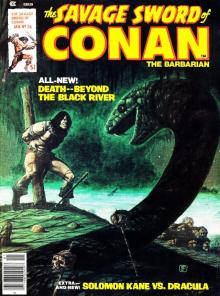 Beyond the Black River
Beyond the Black River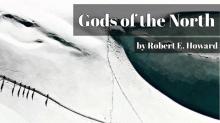 Gods of the North
Gods of the North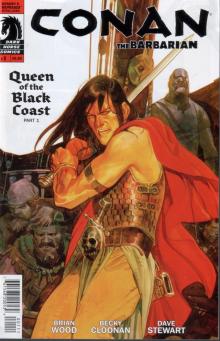 Queen of the Black Coast
Queen of the Black Coast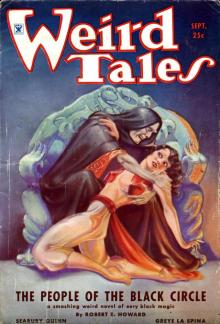 The People of the Black Circle
The People of the Black Circle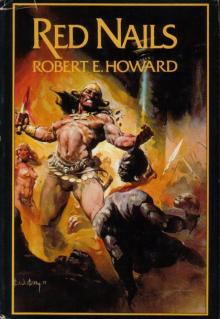 Red Nails
Red Nails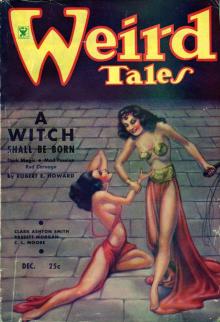 A Witch Shall Be Born
A Witch Shall Be Born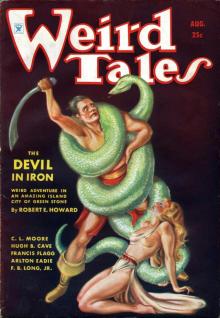 The Devil in Iron
The Devil in Iron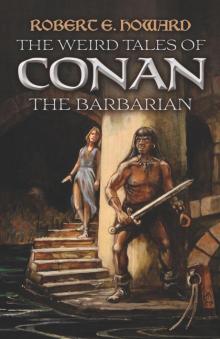 The Weird Tales of Conan the Barbarian
The Weird Tales of Conan the Barbarian The Bloody Crown of Conan
The Bloody Crown of Conan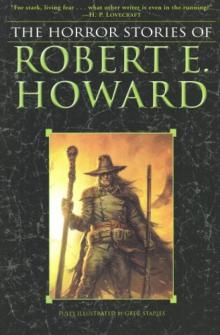 The Horror Stories of Robert E. Howard
The Horror Stories of Robert E. Howard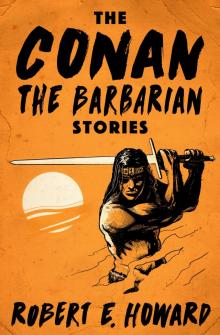 Conan the Conqueror
Conan the Conqueror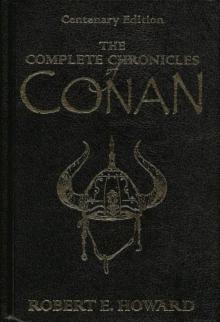 Conan the Barbarian
Conan the Barbarian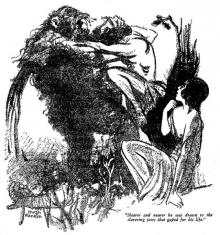 Shadows in the Moonlight
Shadows in the Moonlight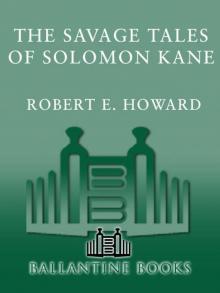 The Savage Tales of Solomon Kane
The Savage Tales of Solomon Kane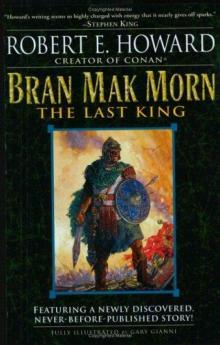 Bran Mak Morn: The Last King
Bran Mak Morn: The Last King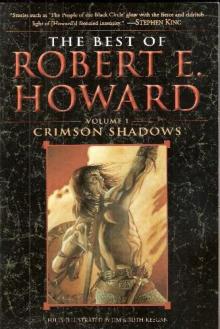 The Best of Robert E. Howard Volume One: Crimson Shadows
The Best of Robert E. Howard Volume One: Crimson Shadows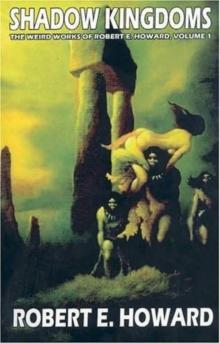 The Best of Robert E. Howard: Crimson Shadows (Volume 1)
The Best of Robert E. Howard: Crimson Shadows (Volume 1)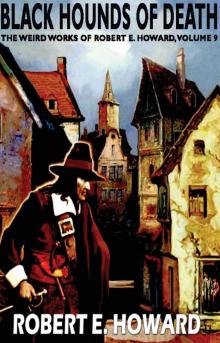 Black Hounds of Death
Black Hounds of Death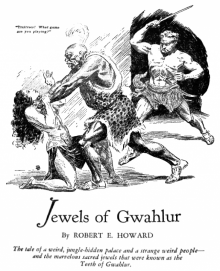 Jewels of Gwahlur
Jewels of Gwahlur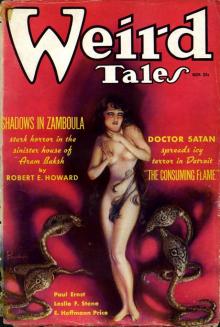 Shadows in Zamboula
Shadows in Zamboula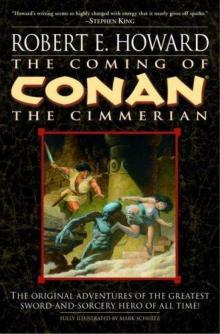 The Coming of Conan the Cimmerian
The Coming of Conan the Cimmerian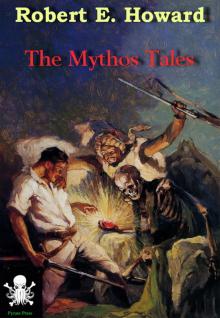 The Mythos Tales
The Mythos Tales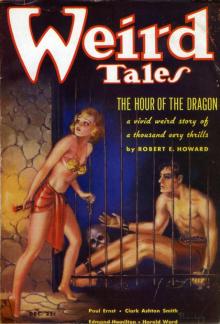 The Hour of the Dragon
The Hour of the Dragon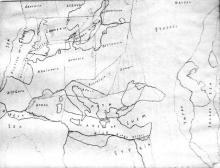 The Hyborian Age
The Hyborian Age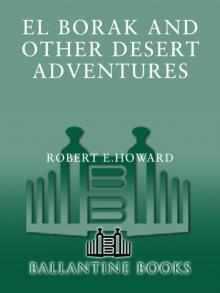 El Borak and Other Desert Adventures
El Borak and Other Desert Adventures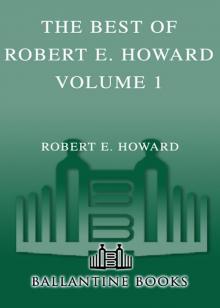 The Best of Robert E. Howard Volume 1 The Best of Robert E. Howard Volume 1
The Best of Robert E. Howard Volume 1 The Best of Robert E. Howard Volume 1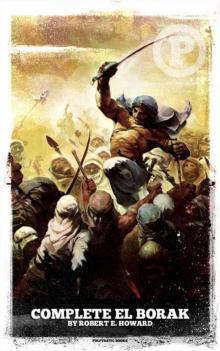 El Borak: The Complete Tales
El Borak: The Complete Tales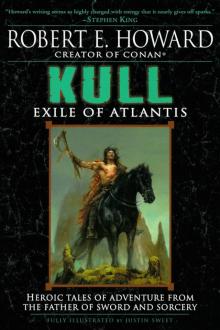 Kull: Exile of Atlantis
Kull: Exile of Atlantis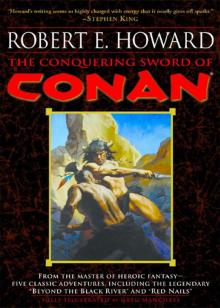 The Conquering Sword of Conan
The Conquering Sword of Conan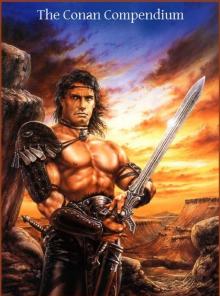 The Conan Compendium
The Conan Compendium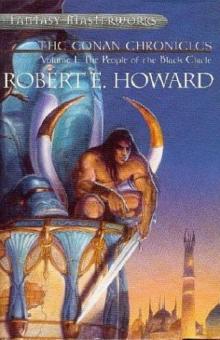 The Conan Chronicles: Volume 1: The People of the Black Circle
The Conan Chronicles: Volume 1: The People of the Black Circle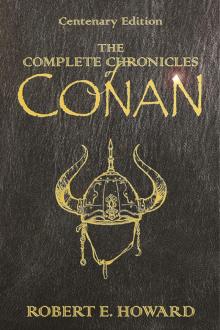 The Complete Chronicles of Conan: Centenary Edition
The Complete Chronicles of Conan: Centenary Edition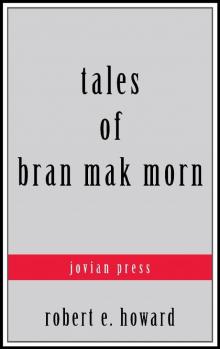 Tales of Bran Mak Morn (Serapis Classics)
Tales of Bran Mak Morn (Serapis Classics)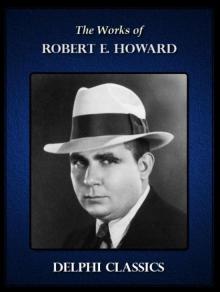 Delphi Works of Robert E. Howard (Illustrated) (Series Four)
Delphi Works of Robert E. Howard (Illustrated) (Series Four)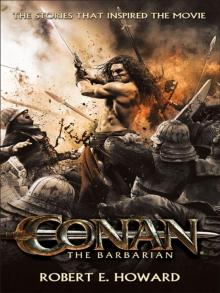 Conan the Barbarian: The Stories That Inspired the Movie
Conan the Barbarian: The Stories That Inspired the Movie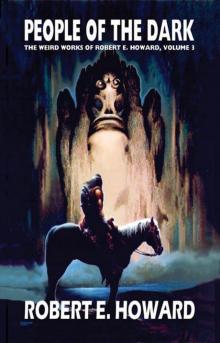 People of the Dark Robert Ervin Howard
People of the Dark Robert Ervin Howard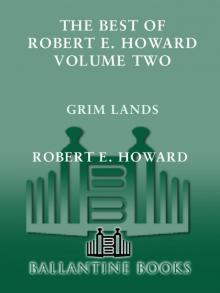 Grim Lands
Grim Lands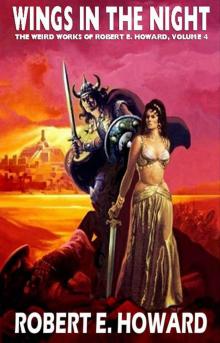 Wings in the Night
Wings in the Night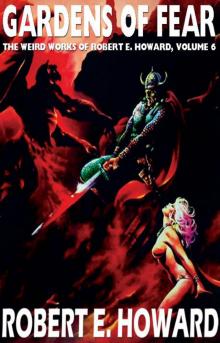 Gardens of Fear
Gardens of Fear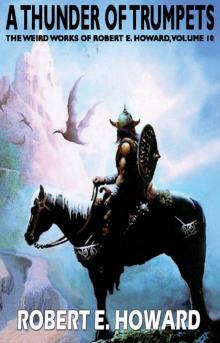 A Thunder of Trumpets
A Thunder of Trumpets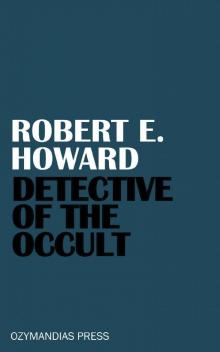 Detective of the Occult
Detective of the Occult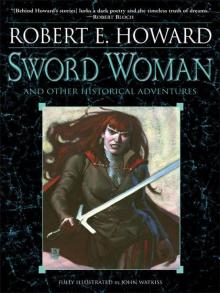 Sword Woman and Other Historical Adventures
Sword Woman and Other Historical Adventures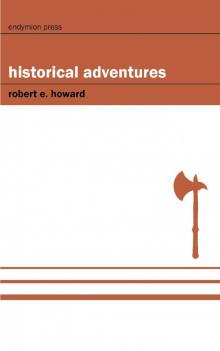 Historical Adventures
Historical Adventures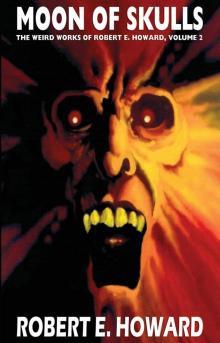 Moon of Skulls
Moon of Skulls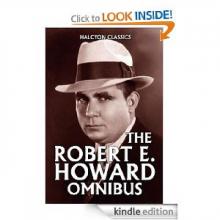 The Robert E. Howard Omnibus: 97 Collected Stories
The Robert E. Howard Omnibus: 97 Collected Stories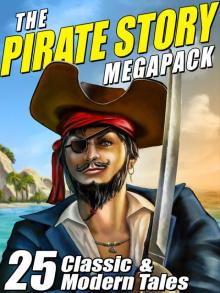 The Pirate Story Megapack: 25 Classic and Modern Tales
The Pirate Story Megapack: 25 Classic and Modern Tales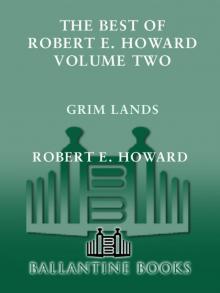 The Best of Robert E. Howard, Volume 2
The Best of Robert E. Howard, Volume 2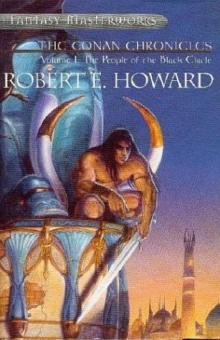 The Conan Chronicles, Vol. 1: The People of the Black Circle
The Conan Chronicles, Vol. 1: The People of the Black Circle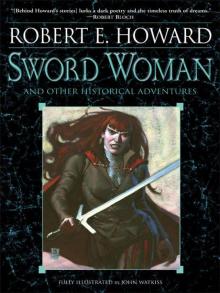 Sword Woman and Other Historical Adventures M
Sword Woman and Other Historical Adventures M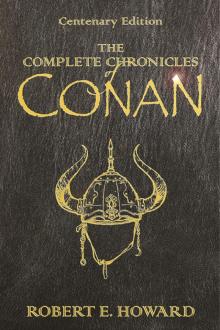 The Complete Chronicles of Conan
The Complete Chronicles of Conan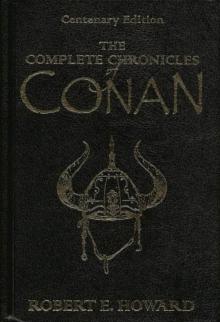 Conan the Barbarian: The Chronicles of Conan (collected short stories)
Conan the Barbarian: The Chronicles of Conan (collected short stories)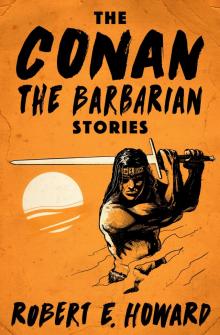 The Conan the Barbarian Stories
The Conan the Barbarian Stories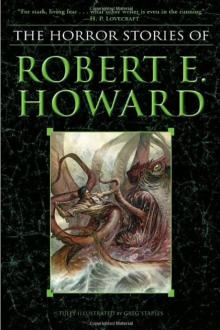 The Best Horror Stories of
The Best Horror Stories of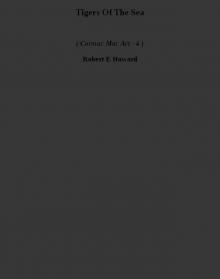 Tigers Of The Sea cma-4
Tigers Of The Sea cma-4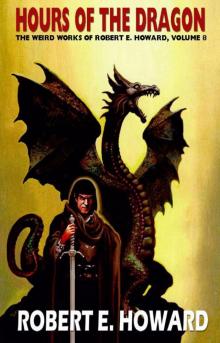 The Hours of the Dragon
The Hours of the Dragon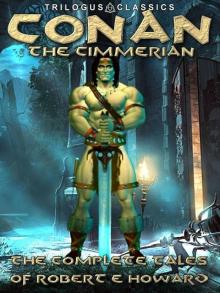 Conan the Cimmerian: The Complete Tales (Trilogus Classics)
Conan the Cimmerian: The Complete Tales (Trilogus Classics)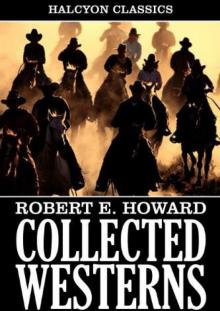 Collected Western Stories of Robert E. Howard (Unexpurgated Edition) (Halcyon Classics)
Collected Western Stories of Robert E. Howard (Unexpurgated Edition) (Halcyon Classics)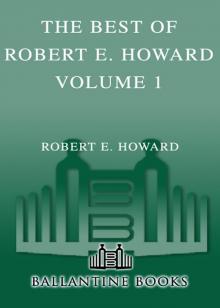 The Best of Robert E. Howard, Volume 1
The Best of Robert E. Howard, Volume 1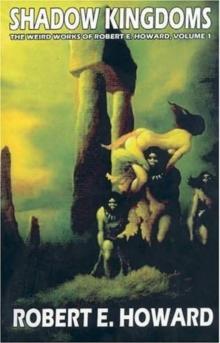 Shadow Kingdoms
Shadow Kingdoms